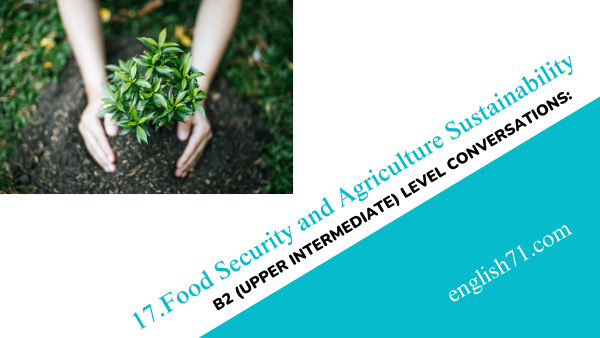B2 (Upper Intermediate) level Conversations: (17) Food Security and Agriculture Sustainability

Kelly: Hi Jake! Have you been keeping up with the latest developments in food security and agriculture sustainability?
Jake: Hey Kelly! Absolutely, it’s an area I’m quite passionate about. There’s so much happening globally. What caught your eye recently?
Kelly: I’ve been reading about the impact of climate change on agriculture. It’s concerning how unpredictable weather patterns are affecting crop yields, especially for small-scale farmers.
Jake: Yeah, climate change is a major challenge. I’ve been looking into sustainable agriculture practices. I believe they can mitigate the impact and make farming more resilient. What’s your take on that?
Kelly: I couldn’t agree more. Organic farming and regenerative agriculture, in particular, seem promising. They not only enhance soil health but also contribute to biodiversity conservation.
Jake: True, and there’s a lot of innovation happening in the field. Precision agriculture and smart farming technologies are helping farmers optimize their resources. Do you think technology plays a crucial role in sustainability?
Kelly: Absolutely, Jake. From drones monitoring crops to data analytics guiding planting decisions, technology can significantly improve efficiency. But, it’s crucial to ensure that these innovations are accessible to all farmers, especially the smaller ones.
Jake: That’s a valid point. Speaking of smaller farmers, education is key. They need information on sustainable practices. I’ve come across programs that aim to empower farmers with knowledge about eco-friendly techniques.
Kelly: Education is indeed vital. And it’s not just about the farmers. Consumers play a role too. Understanding where our food comes from and how it’s produced can drive demand for sustainable practices.
Jake: Agreed. Reducing food waste is another aspect. It’s shocking how much food is wasted globally. Have you looked into any initiatives addressing this issue?
Kelly: Definitely. Circular economy principles are gaining traction in the food industry. From reducing packaging waste to repurposing by-products, there’s a shift towards more sustainable practices.
Jake: On a similar note, I’ve been fascinated by vertical farming and its potential to address space and resource constraints. It seems like a game-changer for urban agriculture.
Kelly: Vertical farming is indeed intriguing. It not only saves space but also minimizes the environmental impact associated with traditional farming. The future of sustainable agriculture might look quite different.
Jake: Shifting to policy matters, how do you think governments can contribute to agricultural sustainability?
Kelly: Governments need to incentivize sustainable practices and support local farmers. Investing in research and development for resilient crop varieties is crucial too. Policies should encourage a transition to more eco-friendly farming methods.
Jake: International collaboration is key too. Sharing successful models and learning from each other’s experiences can benefit everyone. Have you seen any examples of effective policies in this regard?
Kelly: Yes, some countries have implemented policies that support agroecology and prioritize local food systems. It’s inspiring to see how such approaches can make a positive impact.
Jake: Absolutely. There seems to be a growing awareness of these issues. Consumers are more conscious, and that’s a positive sign. It’s heartening to see people advocating for sustainable and ethically produced food.
Kelly: Totally agree, Jake. We’re on the right path, but there’s still work to be done. Let’s continue raising awareness and pushing for policies that contribute to a more sustainable global food system.
Jake: Absolutely, Kelly. Together, we can make a difference.



Summary:
Kelly and Jake engaged in a comprehensive discussion on food security and agriculture sustainability. They covered topics such as the impact of climate change on crop yields, the importance of sustainable agriculture practices, and the role of technology in enhancing efficiency. The conversation also touched on the significance of education for farmers, consumer awareness, and initiatives addressing food waste. Both emphasized the need for supportive government policies, international collaboration, and the growing role of conscious consumers in fostering a more sustainable global food system. Overall, they expressed optimism about the ongoing efforts but acknowledged the continued work required to achieve lasting change.

